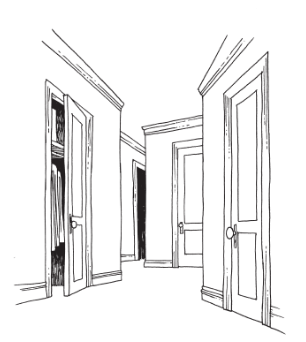The first Russell Edson prose poem I ever read was “Counting Sheep.” A rumpled photocopy was making the rounds of my grad program like some sort of hallucinogenic bean. The poem begins: “A scientist has a test tube full of sheep. He wonders if he should try to shrink a pasture for them. // They are like grains of rice.” The poem was written at the same grade-level as USA Today, but it took the top of my head off per Emily Dickinson’s dictum—it moved me as much as any so-called real, immortal art. And, to my amazement, the lines were free from the self-congratulation that Wallace Stevens warned against when he wrote Be thou the voice, not you. What? You could do that?
Updike has called the voice of the late American fiction-writer William Maxwell “one of the wisest in American literature, as well as one of the kindest.” Although Maxwell’s realistic stories and novels share little with the nightmares and dream-visions of Edson’s prose poems, Maxwell’s kindness, a gentle welcoming to the world of his art, is a quality Russell Edson, the writer, shares. And gentleness is a trait seldom found in antirealistic work—work which, in its worst forms, sets up stumbling blocks in front of sense to create the semblance of difficulty, and makes the reader into a befuddled detective. Edson has said himself that his work strives to be something “having no more pretension than a child’s primer. Which may,” he adds, “be its own pretension.”
Edson was born in Connecticut in 1935 and lives there unpretentiously with his wife, Frances. Since 1960, he has published eleven collections of prose poems, a collection of plays, two novels, and countless chapbooks. Many of these are out of print and hard to find even from the most reliable rare-book vendors. The Tunnel: Selected Poems, published in Oberlin College Press’s Field Poetry Series in 1994, remains the most accessible conduit to poems from Edson’s earlier collections, such as The Clam Theater and The Childhood of an Equestrian, but twenty-odd poems from each collection are not enough to describe the arcs of the individual books. The rights to Edson’s out-of-print collections need to be purchased, and soon, by a single publisher who pledges to put them back into print for a good long while.
Edson’s voice is unmistakable, and yet, in his historic 1999 interview with Peter Johnson, editor of the unfortunately defunct journal The Prose Poem: An International Journal, he says: “[A]nybody could write like Edson if they wanted to. I find myself doing it all the time.” What is it to write like Edson?...
You have reached your article limit
Sign up for a digital subscription and continue reading all new issues, plus our entire archives, for just $1.50/month.
Already a subscriber? Sign in





